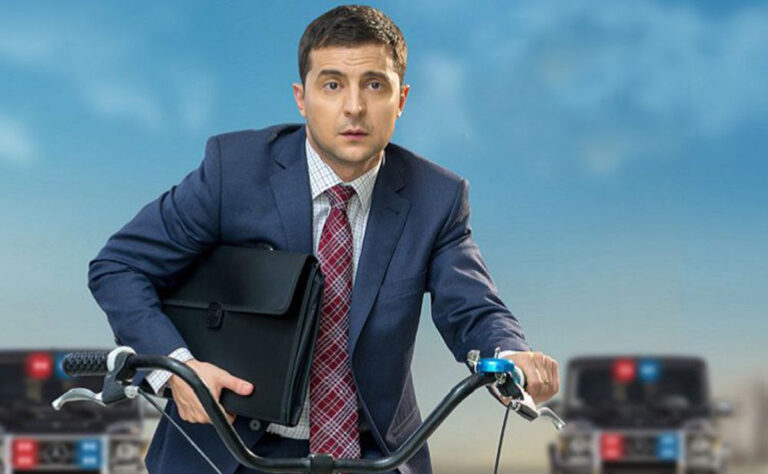How Volodymyr Zelensky went from comedian to anti-corruption Ukrainian President

Born in the then-Soviet Union Kryvyi Rih (also known as Krivoy Rog)—the largest city in central Ukraine and the seventh most populous one in the country—Volodymyr Zelensky, before getting elected as president in May 2019, was mostly known as an actor and comedian as well as the founder of the production company Kvartal 95 Studio. It is through a series of unlikely, almost cinematic, events that Zelensky found his way to becoming Ukraine’s president. Let’s get into it, shall we?
Zelensky played the role of Ukraine’s president before becoming it
Among other TV shows and movies Kvartal 95 Studio produced was Servant of the People, a Ukrainian political satire comedy television series created and produced by Zelensky himself. The actor-turned-political figure also starred in it as Vasyl Petrovych Holoborodko, a high-school history teacher in his thirties who is unexpectedly elected president of Ukraine after a viral video filmed by one of his students shows him making a profane rant against government corruption in his country.
The series aired from 2015 to 2019 and was immensely popular in the country. Shortly after, a real-life political party bearing the same name as the TV show was launched in March 2018 by employees of Kvartal 95 Studio. Let’s take a minute to pause here and process things. Zelensky’s fictional presidential character led him to create his own real political party, also named Servant of the People—promoting the same messages the character from the show originally did. It’s safe to say that Ronald Reagan and Arnold Schwarzenegger have nothing on the man.
He then went on to announce his candidacy for the 2019 Ukrainian presidential election on the evening of 31 December 2018, alongside the New Year’s Eve address of former President Petro Poroshenko. Previously considered a political outsider, Zelensky had since become one of the frontrunners in opinion polls for the election. He, as we know, ended up winning the election with 73.2 per cent of the vote in the second round, defeating Poroshenko.
This is where things get interesting—Zelensky identifies as a populist, meaning he has positioned himself as an anti-establishment and anti-corruption figure. This stance is part of why Russia is currently invading Ukraine.
“You don’t need experience to be president. You just need to be a decent human being.”
An anti-corruption and anti-oligarch president
After being inaugurated on 20 May 2019 and becoming the first Jewish president of Ukraine, Zelensky presented a key initiative on reintroducing criminal liability for illegal enrichment. Though it was eventually refused on 6 June, a similar bill proposed by a group of deputies was added to the parliament’s agenda. Around the same time, it was announced that the president’s third major initiative—which seeks to remove immunity from lawmakers, diplomats and judges—would be submitted after the July 2019 Ukrainian parliamentary election.
In January 2021, parliament passed a bill updating and reforming Ukraine’s referendum laws, which the country’s Constitutional Court had declared unconstitutional back in 2018. Fixing the referendum law had been one of Zelensky’s campaign promises.
As a native Russian speaker, Zelensky has been supported by millions of Russian-speaking Ukrainian voters who had felt disenfranchised by previous administrations. It is this same alienation that Russia (or more accurately its president, Vladimir Putin) has tried to exploit by supporting pro-Russia Ukrainian separatists. The mere fact that Ukraine is a democracy has been threatening to the Kremlin and Russian officials have often accused Zelensky of being a Western ‘marionette’.
Though he managed to crack down on Ukraine’s oligarch elite—which was still heavily criticised by his opposition as an attempt to strengthen his presidential powers behind a facade of populist rhetoric—Zelensky failed to deliver on his biggest campaign promise: to end the long-simmering war between government forces and the Moscow-backed separatists in Ukraine’s East.
The conflict became critical after Russia officially recognised the breakaway territories, Donetsk People’s Republic and Luhansk People’s Republic. The move paved the way for the invasion only days later.
Where’s the Ukrainian president now?
Though he was slow to get around to it, appearing too calm when he first spoke publicly about a nearing invasion of his people on 19 January, Zelensky has now morphed into a wartime leader who (at least for now) is being supported by Ukrainian society, including his opponents.
“No Ukrainian president has ever dealt with a full-on invasion on his territory,” Valentyn Gladkykh, a Kyiv-based political analyst, told NBC News. “Having encountered the unprecedented threat, Zelenskyy has shown his best side.”
The president vowed to remain in Kyiv as missiles pounded the capital and Russian forces pushed inward. On Tuesday 1 March, Oleksiy Danilov, the secretary of Ukraine’s National Security and Defense Council, said during a broadcast marathon airing on Ukrainian TV channels that officials were recently tipped off that a unit of Kadyrovites (elite Chechen special forces) was on its way to kill Zelensky. After Ukrainian officials were informed by Russia’s Federal Security Service (FSB), the Chechen special forces were killed Saturday 26 February on the outskirts of Kyiv, Danilov revealed.
“We are well aware of the special operation that was to take place directly by the Kadyrovites to eliminate our president. And I can say that we have received information from the FSB, who today do not want to take part in this bloody war,” Danilov said. “And thanks to this, the Kadyrov elite group was destroyed, which came here to eliminate our president.”
Faced with few options as the Russian offensive intensifies, as of now, Zelensky remains defiant.





